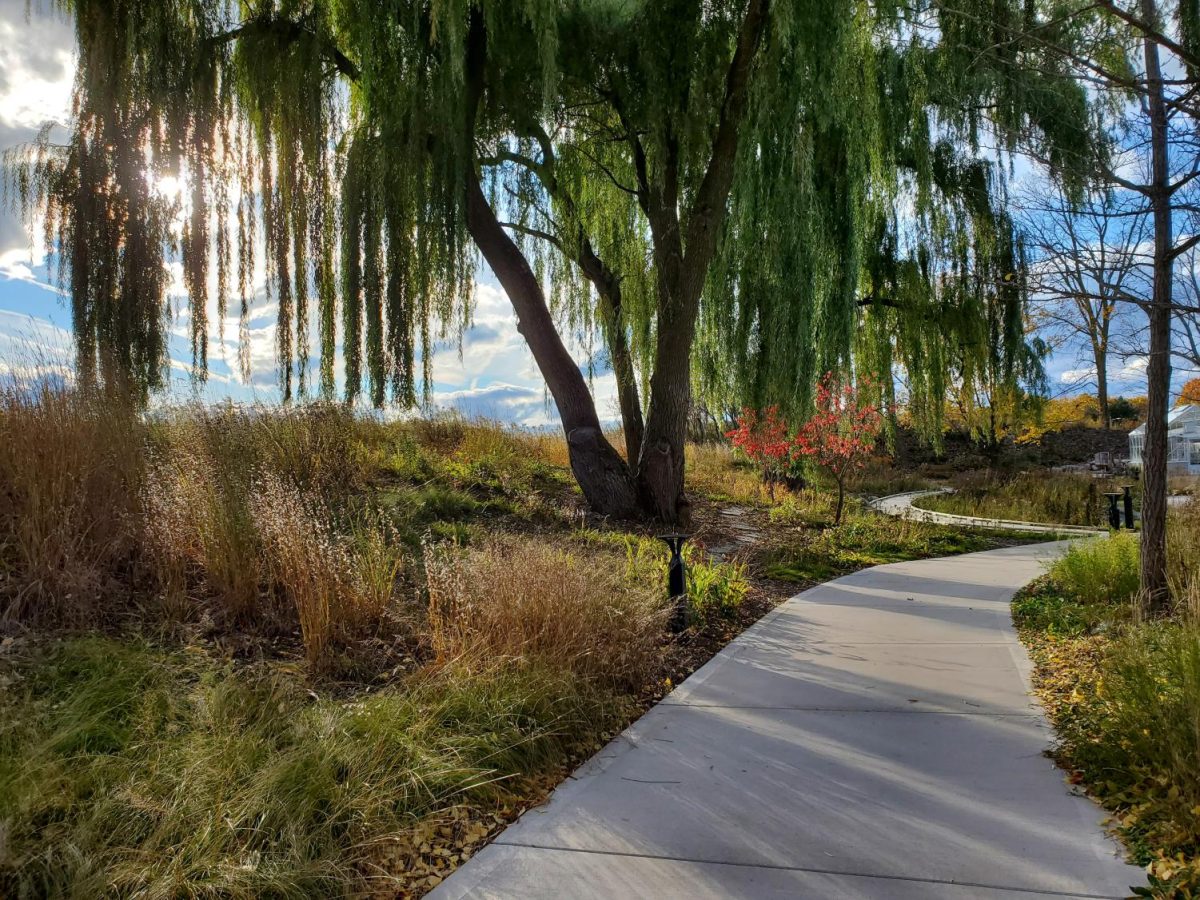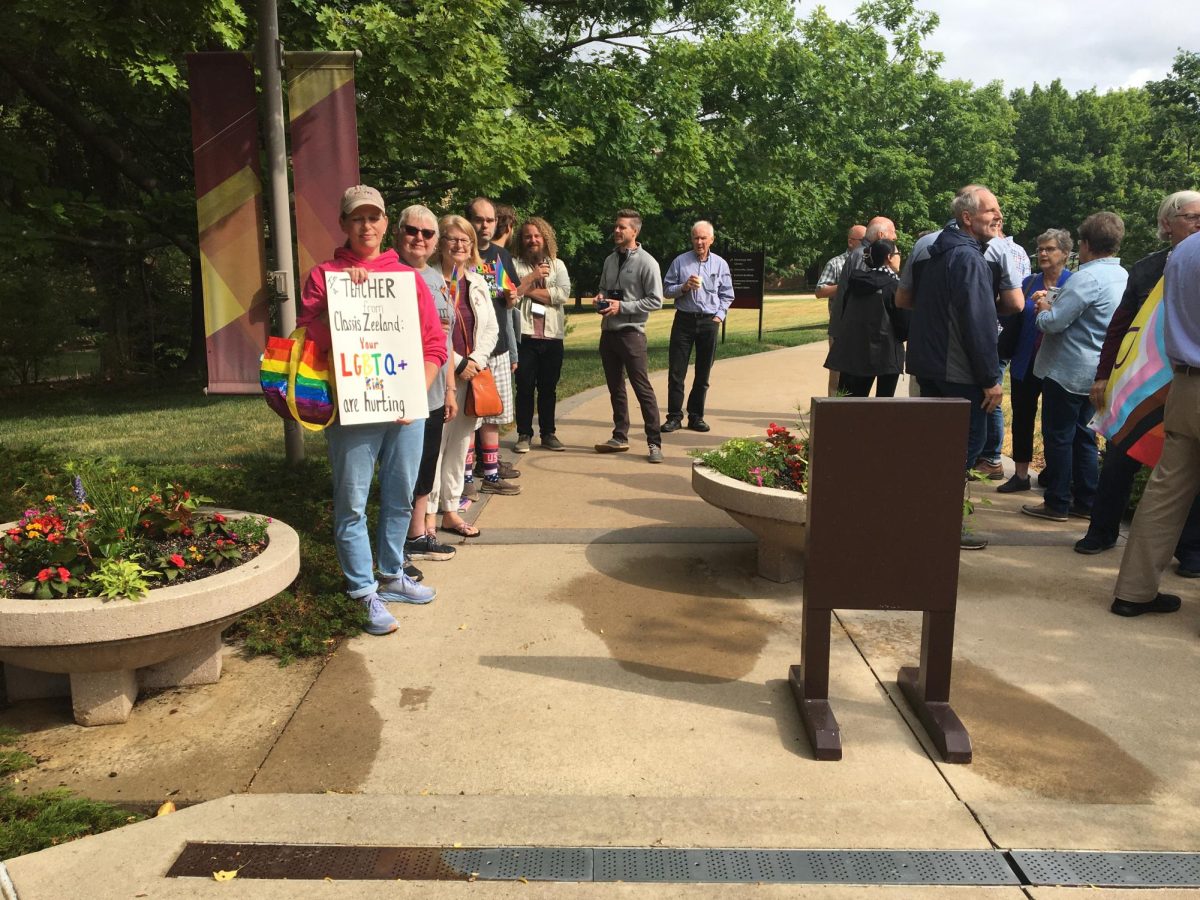This Saturday, BioLogos — an organization headed by former Calvin physics and astronomy professor Deborah Haarsma — held its first in-person Creation Care Summit at Calvin University’s Prince Conference Center.
The summit looked to address the relationship between environmental issues and the Christian faith. Speakers included two Calvin professors — Dave Warners and Ryan Bebej — and Calvin grad Jason Fileta, as well as many scholars and writers from outside Calvin. According to David Buller, a variety of denominations were represented, including the Christian Reformed Church of North America (CRCNA), the Reformed Church of America, the Mennonite Church USA, the Seventh-Day Adventist Church and non-denominational churches. An earlier, virtual-only Creation Care Summit was held in 2021.
BioLogos was founded in 2009 by geneticist Francis Collins to “show how we can resolve seeming conflicts between modern science and Christian faith, and explore areas where science and faith can work together,” according to Buller. While BioLogos initially focused on questions about evolution and creation, it has since expanded to include other topics, including environmental issues.
Speaker Jonathan Moo, professor of New Testament and environmental studies at Whitworth University, said that discussion of creation care within the Church has the potential to “open up places of participation and dialogue with others who are working for a more just, sustainable world.”
Another speaker, naturalist and author Sy Montgomery, also pointed to the wide-reaching nature of environmental work. “It seems that no matter what you believe, honoring the natural world brings us joy,” said Montgomery.
Montgomery has written many works of creative nonfiction on nature and animals for children and adults, including 2015 National Book Award finalist “The Soul of the Octopus.” While her works are not explicitly religious in nature, Montgomery told Chimes that her works are a “praise for creation — whether you believe in creation or not.”
A Christian raised in the Methodist tradition, Montgomery described having a long-standing relationship between her faith and the natural world; she quoted from Psalm 148 as an example of “just one of the Psalms that talks about the beauty of the natural world.” In high school, she and her friends would go into the New Jersey mountains to read their Bibles and pray. “When you’re in creation, you touch the Creator,” said Montgomery.
Now, as an adult who writes books, Montgomery said she sees respect and love for a creation as connected to love and respect for its creator; conversely, a lack of respect for a creation signals a lack of respect for its creator.
“When we wreck the climate of our planet, when we destroy entire species, we are spitting in the face of our Creator,” said Montgomery.
Warners, who discussed topics related to his work as the director of Plaster Creek Stewards, also said his faith has supported his concern for the environment.
“At Calvin and in Reformed Christianity, we talk so much about the importance of creation — that it’s not just simply about a drive for human salvation, that it’s for God so loved the world, he loves everything,” said Warners.
Moo also described faith as a motivating factor in ecological work. “The reason that we work for environmental justice is because of our love for other people, our love for the Earth and its creatures and our love for God,” said Moo.
However, for some, the relationship between their faith and their concern for creation has not always been so smooth. While working on a graduate degree in wildlife ecology, Moo said it “sometimes felt like my church and Christians in general were unaware of” current environmental issues, which was a “source of pain and struggle” for him.
Moo said he doesn’t blame his previous church — a Baptist congregation — for this problem; instead, he sees it as part of a larger adoption within “Western Christianity and especially American Christianity” of “dualisms where… the stuff of this material, earthy world doesn’t matter to our faith, doesn’t matter to God.” Specific beliefs such as the Rapture — “the notion that it’s all going to burn and we’re all going to escape from this material world” — may also lead to a lack of concern for creation, according to Moo.
In part because of this frustration with the church’s response to environmental issues, Moo said he began reading theology again and completed a doctorate in biblical studies at Cambridge University, where he became involved with the Faraday Institute for Science and Religion. While in England, he also joined the Church of England, a move motivated in part by an appreciation for its Book of Common Prayer and other liturgies. Moo is now a member of the Anglican Church of North America, and he said his specific congregation is interested in “restoration of people in community and the land itself.”
Part of his presentation will be on how “the created world is caught up in the story of redemption all the way from Genesis to Revelation in Scripture, and therefore our calling is to participate in what God intends to do,” said Moo.
Even in denominations where there is a strong history of support for the concept of creation care, putting it into practice can be difficult. “Even when our beliefs ought to lead us to certain ways of action, it’s too often our lives are more hypocritical than they ought,” said Moo.
Warners said part of his presentation discusses different frames for understanding creation care, and that it is a “foretaste” of his upcoming book “Reconciliation in a Michigan Watershed” — set to be released by Michigan State Press in spring 2024 — which uses Plaster Creek case study “as a metaphor for how we need to think better about our place in the world.”
According to Warners, the CRCNA and other denominations “talked about stewardship for many years” but he doesn’t think that “stewardship has gained a lot of traction with people of faith.” In part, this may be because “stewardship” frames creation care as a “duty” and “also doesn’t take an honest look at ourselves and recognize that we’re the problem,” said Warners.
Instead, Warners would like to introduce “reconciliation ecology” –– a concept introduced in 2003 by Michael Rosenzweig –– which involves “recognizing that there’s a lot of brokenness [in the human-creation relationship] and then asking the question, ‘What is it that humans need to do to make that a healthy relationship again?’”
While not introduced as a specifically Christian ecological concept, Warners said “it’s a word that ought to catch the ear of people of faith.”
According to Moo, one distinguishing characteristic of specifically Christian ecology is its “hopeful vision” for the human-creation relationship.
“Even when our efforts don’t seem to be bearing fruit in the short-term, I think Christians ought to have a particular ability to preserve and motivation to keep going because our trust is not finally in ourselves, but in the God who has promised to renew all things in Christ,” said Moo.
David Buller is not a relative of Grace Buller.







